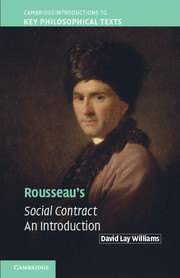Chapter 2 - Book II
Published online by Cambridge University Press: 05 June 2014
Summary
Overview
Whereas Book I is largely dedicated to the mission of demonstrating the need for a social contract and the general will, Book II addresses the nature of the general will and how it might animate the foundation of a republic. In the first four chapters here, Rousseau establishes the tight relationship between sovereignty and the general will. In doing so, he establishes his unique brand of popular sovereignty – namely, that the people are sovereign insofar as their will corresponds to the general will. If their will deviates from the general will, the result is merely an aggregation of particular wills or a “will of all.”
The remainder of Book II is largely directed to the problem of constitutional or founding law. That is, once the people have unanimously agreed to be governed by the general will, how does that general will animate the founding of constitutional laws? This matter is considerably complicated by the fact that a “blind multitude” of people “often does not know what it wills because it rarely knows what is good for it” (SC, 2.6.10, 68 [III: 380]). Into this broad ignorance, Rousseau introduces the character of the lawgiver, a figure of “superior intelligence” (SC, 2.7.1, 68 [III: 381]) and “a great soul” (SC, 2.7.11, 71 [III: 384]). The lawgiver must have both great art and great technical talents. He must artfully rally the still raw citizens to support a new constitution of his own design by virtue of a surprising appeal to divine authority. At the same time, the lawgiver must have exceptional technical skills and empirical knowledge about governments, laws, institutions, and especially knowledge of the people for whom he is to legislate. Rousseau dedicates three chapters here specifically to the problem of understanding a people before designing institutions for them and insists that although the idea of justice is itself universal, the constitution for each country must be adapted to local conditions and the idiosyncratic nature of each people.
- Type
- Chapter
- Information
- Rousseau's Social ContractAn Introduction, pp. 64 - 106Publisher: Cambridge University PressPrint publication year: 2014



